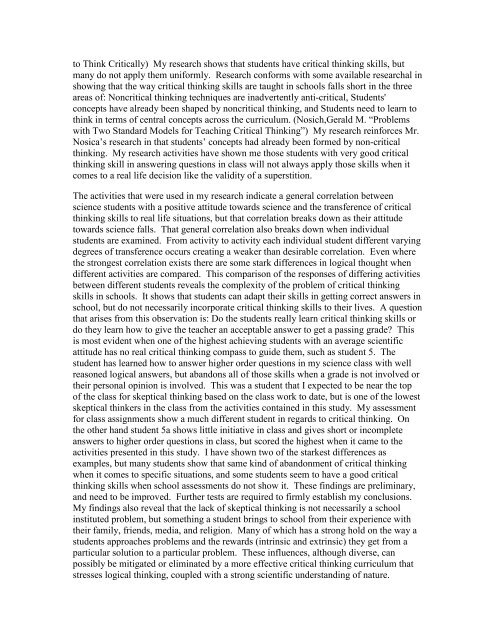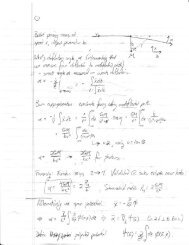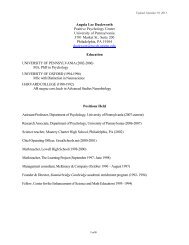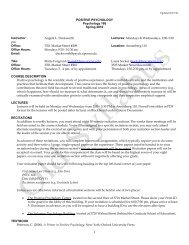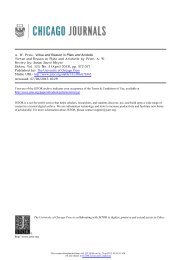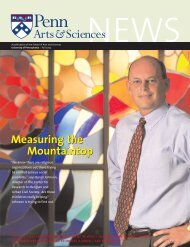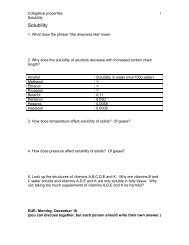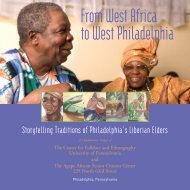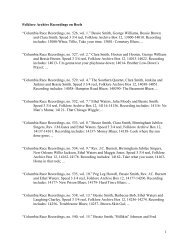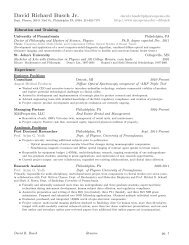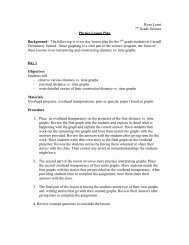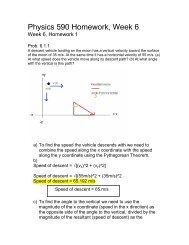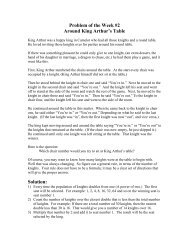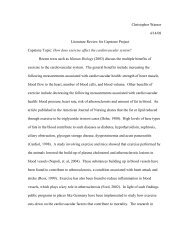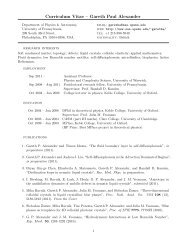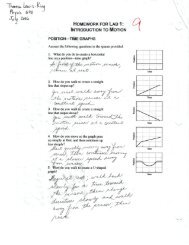Skeptical Thinking in the Classroom and its Impact - School of Arts ...
Skeptical Thinking in the Classroom and its Impact - School of Arts ...
Skeptical Thinking in the Classroom and its Impact - School of Arts ...
Create successful ePaper yourself
Turn your PDF publications into a flip-book with our unique Google optimized e-Paper software.
to Th<strong>in</strong>k Critically) My research shows that students have critical th<strong>in</strong>k<strong>in</strong>g skills, but<br />
many do not apply <strong>the</strong>m uniformly. Research conforms with some available researchal <strong>in</strong><br />
show<strong>in</strong>g that <strong>the</strong> way critical th<strong>in</strong>k<strong>in</strong>g skills are taught <strong>in</strong> schools falls short <strong>in</strong> <strong>the</strong> three<br />
areas <strong>of</strong>: Noncritical th<strong>in</strong>k<strong>in</strong>g techniques are <strong>in</strong>advertently anti-critical, Students'<br />
concepts have already been shaped by noncritical th<strong>in</strong>k<strong>in</strong>g, <strong>and</strong> Students need to learn to<br />
th<strong>in</strong>k <strong>in</strong> terms <strong>of</strong> central concepts across <strong>the</strong> curriculum. (Nosich,Gerald M. “Problems<br />
with Two St<strong>and</strong>ard Models for Teach<strong>in</strong>g Critical <strong>Th<strong>in</strong>k<strong>in</strong>g</strong>”) My research re<strong>in</strong>forces Mr.<br />
Nosica’s research <strong>in</strong> that students’ concepts had already been formed by non-critical<br />
th<strong>in</strong>k<strong>in</strong>g. My research activities have shown me those students with very good critical<br />
th<strong>in</strong>k<strong>in</strong>g skill <strong>in</strong> answer<strong>in</strong>g questions <strong>in</strong> class will not always apply those skills when it<br />
comes to a real life decision like <strong>the</strong> validity <strong>of</strong> a superstition.<br />
The activities that were used <strong>in</strong> my research <strong>in</strong>dicate a general correlation between<br />
science students with a positive attitude towards science <strong>and</strong> <strong>the</strong> transference <strong>of</strong> critical<br />
th<strong>in</strong>k<strong>in</strong>g skills to real life situations, but that correlation breaks down as <strong>the</strong>ir attitude<br />
towards science falls. That general correlation also breaks down when <strong>in</strong>dividual<br />
students are exam<strong>in</strong>ed. From activity to activity each <strong>in</strong>dividual student different vary<strong>in</strong>g<br />
degrees <strong>of</strong> transference occurs creat<strong>in</strong>g a weaker than desirable correlation. Even where<br />
<strong>the</strong> strongest correlation exists <strong>the</strong>re are some stark differences <strong>in</strong> logical thought when<br />
different activities are compared. This comparison <strong>of</strong> <strong>the</strong> responses <strong>of</strong> differ<strong>in</strong>g activities<br />
between different students reveals <strong>the</strong> complexity <strong>of</strong> <strong>the</strong> problem <strong>of</strong> critical th<strong>in</strong>k<strong>in</strong>g<br />
skills <strong>in</strong> schools. It shows that students can adapt <strong>the</strong>ir skills <strong>in</strong> gett<strong>in</strong>g correct answers <strong>in</strong><br />
school, but do not necessarily <strong>in</strong>corporate critical th<strong>in</strong>k<strong>in</strong>g skills to <strong>the</strong>ir lives. A question<br />
that arises from this observation is: Do <strong>the</strong> students really learn critical th<strong>in</strong>k<strong>in</strong>g skills or<br />
do <strong>the</strong>y learn how to give <strong>the</strong> teacher an acceptable answer to get a pass<strong>in</strong>g grade? This<br />
is most evident when one <strong>of</strong> <strong>the</strong> highest achiev<strong>in</strong>g students with an average scientific<br />
attitude has no real critical th<strong>in</strong>k<strong>in</strong>g compass to guide <strong>the</strong>m, such as student 5. The<br />
student has learned how to answer higher order questions <strong>in</strong> my science class with well<br />
reasoned logical answers, but ab<strong>and</strong>ons all <strong>of</strong> those skills when a grade is not <strong>in</strong>volved or<br />
<strong>the</strong>ir personal op<strong>in</strong>ion is <strong>in</strong>volved. This was a student that I expected to be near <strong>the</strong> top<br />
<strong>of</strong> <strong>the</strong> class for skeptical th<strong>in</strong>k<strong>in</strong>g based on <strong>the</strong> class work to date, but is one <strong>of</strong> <strong>the</strong> lowest<br />
skeptical th<strong>in</strong>kers <strong>in</strong> <strong>the</strong> class from <strong>the</strong> activities conta<strong>in</strong>ed <strong>in</strong> this study. My assessment<br />
for class assignments show a much different student <strong>in</strong> regards to critical th<strong>in</strong>k<strong>in</strong>g. On<br />
<strong>the</strong> o<strong>the</strong>r h<strong>and</strong> student 5a shows little <strong>in</strong>itiative <strong>in</strong> class <strong>and</strong> gives short or <strong>in</strong>complete<br />
answers to higher order questions <strong>in</strong> class, but scored <strong>the</strong> highest when it came to <strong>the</strong><br />
activities presented <strong>in</strong> this study. I have shown two <strong>of</strong> <strong>the</strong> starkest differences as<br />
examples, but many students show that same k<strong>in</strong>d <strong>of</strong> ab<strong>and</strong>onment <strong>of</strong> critical th<strong>in</strong>k<strong>in</strong>g<br />
when it comes to specific situations, <strong>and</strong> some students seem to have a good critical<br />
th<strong>in</strong>k<strong>in</strong>g skills when school assessments do not show it. These f<strong>in</strong>d<strong>in</strong>gs are prelim<strong>in</strong>ary,<br />
<strong>and</strong> need to be improved. Fur<strong>the</strong>r tests are required to firmly establish my conclusions.<br />
My f<strong>in</strong>d<strong>in</strong>gs also reveal that <strong>the</strong> lack <strong>of</strong> skeptical th<strong>in</strong>k<strong>in</strong>g is not necessarily a school<br />
<strong>in</strong>stituted problem, but someth<strong>in</strong>g a student br<strong>in</strong>gs to school from <strong>the</strong>ir experience with<br />
<strong>the</strong>ir family, friends, media, <strong>and</strong> religion. Many <strong>of</strong> which has a strong hold on <strong>the</strong> way a<br />
students approaches problems <strong>and</strong> <strong>the</strong> rewards (<strong>in</strong>tr<strong>in</strong>sic <strong>and</strong> extr<strong>in</strong>sic) <strong>the</strong>y get from a<br />
particular solution to a particular problem. These <strong>in</strong>fluences, although diverse, can<br />
possibly be mitigated or elim<strong>in</strong>ated by a more effective critical th<strong>in</strong>k<strong>in</strong>g curriculum that<br />
stresses logical th<strong>in</strong>k<strong>in</strong>g, coupled with a strong scientific underst<strong>and</strong><strong>in</strong>g <strong>of</strong> nature.


